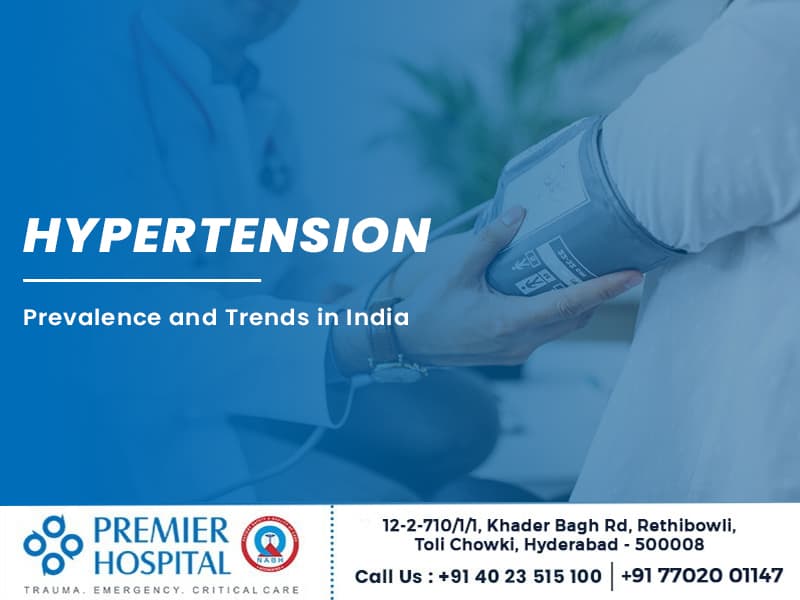Hypertension – Prevalence and Trends in India
by Premier Hospitals | April 27, 2023 |
What is High blood pressure?
High blood pressure, also called hypertension, occurs when the high blood pressure in arteries pushes against their walls. The normal blood pressure in adults is 120/80 mm Hg, but readings higher than that signify high blood pressure. It is a threat that leads to various cardiovascular diseases. Generally, it has no warning signs or symptoms, but with time its consequences can lead to serious health problems such as heart attack, heart failure, kidney failure, etc.Causes of high blood pressure:
There might be several causes of high blood pressure, including changes in the body or even a specific genetic feature. Common causes of high blood pressure are:- Obesity
- Kidney diseases
- Diabetes
- Thyroid
- Obstructive sleep apnea, etc.
It is alarming:
High blood pressure ranks third among the top three risk factors for attributable disease burden in south Asia since 2010. High blood pressure has been a cause of 57% of all stroke deaths and 24% of all coronary heart disease (CHD) in India. According to a study conducted by The Global and Regional Burden of disease and risk factors, it has been ranked second only to children underweight for age in a systematic analysis of population health data for attributable deaths and attributable disease burden. Global Burden of Hypertension 2005 study, the GBD 2010 study, and the WHO 2011 NCD India specific data portray a grim picture for the 17.8% of the World population who reside in India.Prevalence in India:
According to a survey, 33% of urban and 25% of rural Indians suffer from high blood pressure, but only 25% of rural and 42% of urban are aware of it. In fact, of the above, only 25% of rural and 38%urban Indians have undergone treatment. However, the good part is that 1/10th of the rural and 1/5th of the urban Indians have normal blood pressure. Despite being highly prevalent in India, there is low awareness, treatment, and control status. Socioeconomic factors, such as women's literacy, poverty, rural residence, and physiological factors, such as obesity, account for its poor control.What are the consequences of high blood pressure?
In addition to affecting blood vessels, high blood pressure can harm your heart, kidneys, eyes, etc. Its damage over time increases and can lead to:- Heart attack: Blocked arteries with debris like fat and cholesterol prevent blood flow to the heart muscles resulting in a heart attack.
- Stroke: It can block blood vessels that supply oxygenated blood to the brain that might even burst to result in a stroke. It can be devastating because brain tissues no longer receive vital nutrients and oxygen to the affected area that begins to die.
- Heart failure: As a result of high blood pressure in the heart, the heart becomes larger and has a harder time pumping blood, resulting in a delay in supplying blood to the rest of the body.
- Angina: Over time, it can lead to microvascular disease. Angina or chest pain are common symptoms.
- Peripheral artery disease (PAD): It can lead to Atherosclerosis, which narrows arteries in the legs, arms, stomach, and head, causing pain, numbness, or fatigue.
- Vision loss: Moreover, it can damage the blood vessels of the eyes, reducing blood flow to them and even causing them to rupture.
Lifestyle changes:
Controlling High blood pressure is not just about taking medications, Lifestyle also plays a vital role. Healthy lifestyle changes can help you prevent, delay, or reduce the need for medication. By making these lifestyle changes, you may control your high blood pressure to a greater extent:- Weight Loss: If you are obese, losing weight can help you reduce blood pressure. Weight gain leads to high blood pressure by putting strains on the heart. However, with each kilogram of weight you lose, the mercury level decreases by 1 mm by lowering the blood pressure in the heart.
- Regular exercising: At Least 30 mins of daily exercise can reduce your blood pressure by 5-8 mm hg. It also helps keep elevated blood pressure from turning into high blood pressure. In addition to exercising or engaging in other activities daily, consulting a healthcare provider can help you reduce stress more effectively.
- Consume less salt: An adult must consume less than 5gms of salt per day. It can be controlled by avoiding foods and beverages containing high amounts of sodium, consuming low-sodium foods, diet rich in potassium and using herbs with spices to enhance flavor.
- Reduce Alcohol Consumption: Alcohol consumption can reduce the effectiveness of medications. Limiting it to less than one drink for women and two for men can help lower blood pressure by about 4 mm Hg.
- Stop Smoking: Stopping smoking can also reduce the risk of heart diseases and improve overall health, possibly leading to a longer life.
- Reduce stress: Long-term (chronic stress) also contributes to high blood pressure. Planning your day and focusing on your priorities, finding ways to resolve conflicts, avoiding stress triggers, indulging in enjoyable activities or hobbies, such as walking or cooking, can help you reduce stress.
Treatment of high blood pressure:
The early stages of high blood pressure can be controlled by making healthy lifestyle changes. However, taking medications becomes necessary when the blood pressure increases. Here are some medications that effectively help with high blood pressure:- Angiotensin-converting enzyme (ACE) inhibitors: ACE inhibitors reduce blood pressure and the risk of heart failure by relaxing blood vessels.
- Diuretics, also known as water pills, are consumed to get rid of salt and water in your blood resulting in lower fluid flow in veins and arteries.
- Beta Blockers: In addition to reducing blood pressure by slowing down the heartbeat, beta-blockers improve blood flow by widening veins and arteries.
- Calcium Channel Blockers: Calcium channel blockers prevent calcium from entering the heart and arteries, thereby relaxing and opening blood vessels.



















